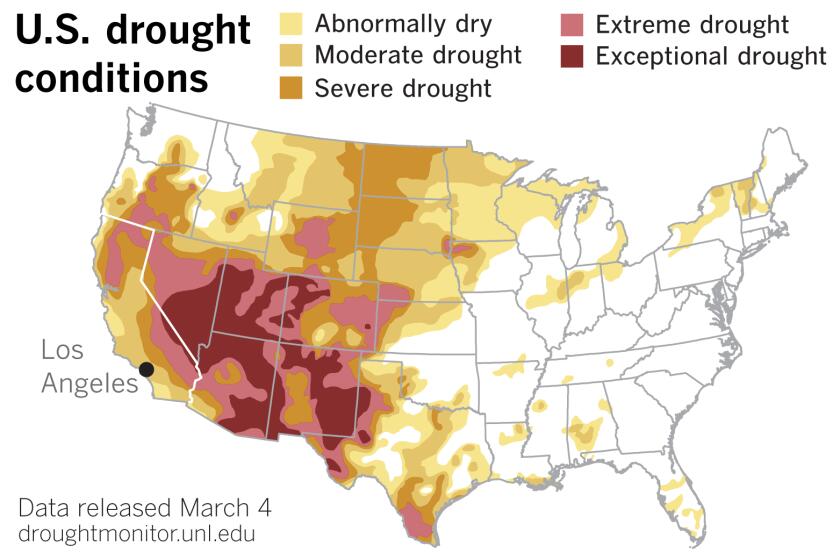More rain forecast for Southern California but it wonât be enough to end drought

A cold storm is expected to bring rain to Southern California next week but it wonât be enough to pull the region out of a lingering drought.
The storm system is expected to move into the Los Angeles area Tuesday afternoon and depart Thursday morning, with the best chance of rain during the day on Wednesday, said Rich Thompson, a meteorologist with the National Weather Service in Oxnard.
âitâs a nice little pattern change, thankfully,â Thompson said. âThis has been a very windy, Santa Ana-type winter so far so itâs nice to get a chance of rain here.â
Preliminary estimates are calling for half an inch to an inch of rain to fall in most areas, with up to an inch and a half in the mountains, Thompson said.
Temperatures are expected to tumble into the mid-50s to lower 60s as the storm system moves in from the northwest, bringing cold air and moisture, he said. Gusty winds are possible across mountain and desert areas as the storm rolls through, he said.
Snow levels could drop to 3,500 to 4,000 feet Wednesday night into Thursday morning, potentially causing travel issues at pass levels along corridors like the Grapevine, Thompson said.
Hereâs a graphic look at where California stands after a dry winter.
Although the prospect of rain comes as welcome news, Southern California remains much drier than normal for this time of year, with L.A.âs total rainfall for the season nearly 7 inches below average. As of 1 a.m. Saturday, 4.55 inches of rain had fallen in downtown Los Angeles since Oct. 1, 2020, compared with a normal rainfall total of 11.5 inches, Thompson said.
And the rainy season is now largely in the rearview: January and February tend to be the wettest months, with average rainfall amounts decreasing in March and April.
âThis storm will help but itâs just going to be probably overall a small dent in the rainfall deficit weâve had this winter so far,â Thompson said. âIt will not get us back to normal.â
More to Read
Sign up for Essential California
The most important California stories and recommendations in your inbox every morning.
You may occasionally receive promotional content from the Los Angeles Times.










